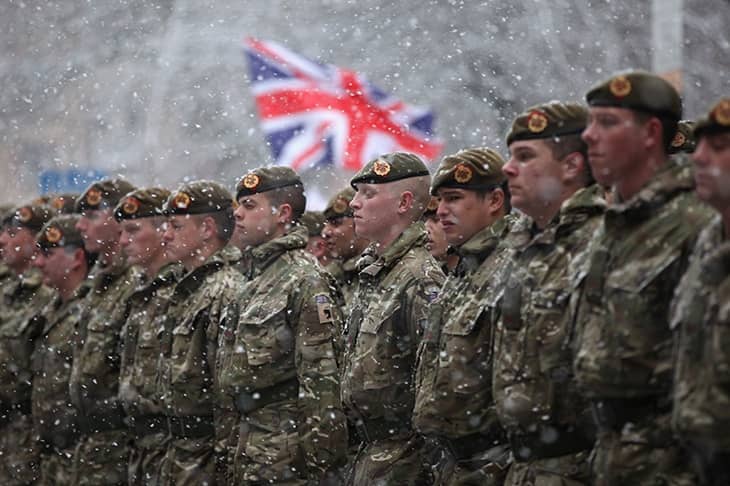Last week, the government published its blueprint for how it intends to remodel the army. According to the plan, it won’t matter that the number of regular troops is being reduced to the smallest size since the Napoleonic wars because the remaining forces will be more ‘agile, integrated, lethal and expeditionary’. A strange theme is emerging in Boris Johnson’s government: the Prime Minister sees the army as the solution to any given problem — yet he is cutting it back to a record low size.
Like Tony Blair before him, Johnson likes to deploy troops — but to help him win battles against his own government machine. He announced this week that the army will be helping out with a speeded-up vaccine booster programme.
His ministers like the responsiveness of the military. Troops do not complain about their working hours. They work weekends if they have to. They are being drafted in to drive ambulances to make up for a shortfall in NHS staff and, in October, they were called up to drive petrol tankers. This winter, the military will be on flood watch. The list continues.
Nobody would be more pleased than Putin to see British soldiers driving ambulances in Glasgow
Yet in recent decades governments have calculated that they can get away with slashing our largely uncomplaining armed forces. As far as the public finances are concerned, the military is considered a soft target. The Defence Secretary and his protests are easily outgunned by the demands of more public-facing departments like health and education.
The armed forces have been stretched both abroad and at home. We may have withdrawn our troops from Afghanistan, but still the signs of strain are unmistakable. This week, Liz Truss was happy to pose in a flak jacket riding in a tank in Estonia as she praised Nato’s operation in eastern Europe, yet initially we sent just ten soldiers to help out Poland with the critical situation on the Belarus border. No doubt they were very high-calibre troops, but it did underline how years of thinning out the military is shrinking our abilities. Only a further hundred were subsequently deployed.
When Blair deployed troops to Basra, the force was barely large enough to protect itself in its airport base. It couldn’t keep the peace in the city, which is why Basra fell into the hands of jihadist death squads. Keen to deploy the army but reluctant to fund it: yet another Blairite trait that the Tories are imitating. The offer to help Joe Biden confront China in the South China Sea is well-meaning, but if the UK wishes to keep up its defence commitments in Europe and tilt to the Pacific then that is going to demand a much bigger increase in defence spending than the one this government has agreed to.
We can be sure that Vladimir Putin will be taking note of Britain’s participation in every military exercise and operation in eastern Europe. Nobody would be more pleased than Russia’s President to see British soldiers driving ambulances in Glasgow rather than be present in former Soviet territories that he deeply regrets no longer form part of his empire.
It is true that the nature of military threat has changed. We now need to be prepared for cyberwarfare, which requires skills the army has not traditionally possessed. The conflict in Nagorno-Karabakh shows how drones are transforming warfare as surely as modern artillery did. We wouldn’t want armed forces that were stuck in the 1940s with vast numbers of personnel but primitive tanks, ships and aircraft, and nothing to counter enemy drones.
But if the past 30 years of conflict in the Middle East and Central Asia have taught us anything, it is that technology has not rendered traditional warfare obsolete. Wars can’t wholly be fought by remote control; if they could be, we would never have surrendered control of Afghanistan to the Taliban.
Once again, we are facing the prospect of a war in Europe — with Russia eyeing up Ukraine, and Belarus flying in asylum-seekers to destabilise the border controls of its neighbours. We often forget that the size of a nation’s army is, in itself, a deterrent. To have soldiers double as ambulance drivers further depletes resources that ought to be focused on defending the realm. If we need a national resilience force to deal with pandemics, floods, supply-chain issues and myriad other problems, then we should create one rather than trying to turn the army into that.
Embedding troops in the Department of Health certainly made the vaccine rollout work better. But the Prime Minister ought to ask: should Britain not have an NHS capable of responding quickly without needing to call in the army? Are we fated to have Whitehall bifurcate into a civil service that cannot be relied upon in an emergency and an army that can?
Were China to help itself to Taiwan, and Russia to seize another slice of Ukraine, we would find ourselves in a very different world. We may still be blinded by the pandemic, but the threat of armed conflict has not gone away. The military ought to be reserved for that purpose.






Comments